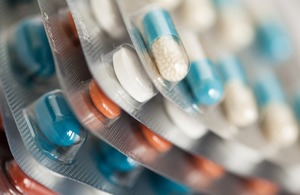New treatments to tackle pandemic of drug-resistant infections
Health Secretary to promote UK’s leading role in bolstering global health security and tackling antimicrobial resistance at Indian Global Forum.

-
People around the world set to benefit from extra UK investment to develop innovative treatments for drug-resistant infections which cost millions of lives every year
-
£4.5 million funding package for research and development group takes total UK investment to nearly £19 million
New treatments to tackle drug-resistant infections that pose the greatest threat to global health are to be developed following a multi-million-pound investment by the UK government.
Antimicrobial resistance (AMR) – where serious infections have evolved so much that antibiotics and other current treatments are no longer effective – is a silent killer costing millions of lives across the world a year, with one in five of these deaths in children under the age of 5.
The £4.5 million investment made by the government’s Global AMR Innovation Fund (GAMRIF) will support the Global Antibiotic Research and Development Partnership (GARDP) to develop new treatments for drug-resistant infections identified by the World Health Organization as the greatest threat to global health and development.
The UK has now invested £19 million in GARDP’s programmes, including developing new and improved treatments for neonatal sepsis – a leading cause of death in new-borns – hospital acquired bacterial infections, and pneumonia.
Recent data shows that around 1.3 million people died of resistant bacterial infections globally in 2019, more than HIV or malaria.
Secretary of State for Health and Social Care, Sajid Javid, said:
Antimicrobial resistance is the greatest threat to global health, tragically killing millions of people every year, but it isn’t widely known about.
The consequences of not addressing this silent pandemic now could be catastrophic and result in a future where we are unable to treat common illnesses such as pneumonia and infections in newborns with modern medicines.
The UK’s investment will develop vital treatments, protecting millions of people in low-and middle-income countries and around the world to bolster our global health security.
The funding will also help develop a novel treatment for gonorrhoea, a sexually transmitted infection that has been identified by the World Health Organization as urgently requiring new antibiotics.
Today’s commitment forms part of the UK government’s 20-year vision and 5-year National Action Plan for Antimicrobial Resistance – an investment that cements the UK’s leading role in tackling AMR across the world.
Manica Balasegaram, GARDP’s Executive Director, said:
The UK’s leadership in accelerating the development and access of treatments for drug-resistant infections is exemplary.
GAMRIF’s investment over the years has helped us build a robust late-stage clinical pipeline of new and improved treatments for gonorrhoea, newborns with sepsis, and serious bacterial infections in hospitalised adults.
We look forward to their continued support as we ramp up efforts to preserve the power of antibiotics.
In 2021, the UK presidency of the G7 also maintained AMR as a multilateral priority and it was recognised as a key health issue by the G7 health and finance ministers.
Professor Dame Sally Davies, UK Special Envoy on AMR, said:
Collaboration with international partners is vital to tackle global challenges, as shown by the G7 health ministers reaffirming their support for GARDP this year.
I am thrilled that the UK will be working in partnership with GARDP to deliver crucial research as part of GAMRIF’s commitment to a One Health approach.
Together we are leading efforts to combat AMR where the burden of infection is greatest, and we will use this investment to develop new treatments for drug-resistant infections to protect the world’s most vulnerable.
The partnership between the UK and GARDP is based on the shared understanding that developing new treatments and ensuring responsible access for all in need are inseparable. Funded by UK aid, this work supports research and development to reduce the threat of antimicrobial resistance.